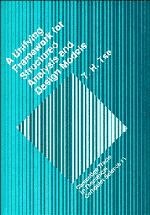 A Unifying Framework for Structured Analysis and Design Models
A Unifying Framework for Structured Analysis and Design Models Book contents
- Frontmatter
- Contents
- Preface
- List of Tables and Figures
- Chapter 1 Introduction
- Chapter 2 Desirable Features of Systems Development Environments
- Chapter 3 A Comparison with Related Work
- Chapter 4 An Initial Algebra Framework for Unifying the Structured Models
- Chapter 5 A Functorial Framework for Unifying the Structured Models
- Chapter 6 The Identification of Unstructuredness
- Chapter 7 A Prototype System to Implement the Unifying Framework
- Chapter 8 Conclusion
- Bibliography
- Index
Chapter 6 - The Identification of Unstructuredness
Published online by Cambridge University Press: 28 January 2010
- Frontmatter
- Contents
- Preface
- List of Tables and Figures
- Chapter 1 Introduction
- Chapter 2 Desirable Features of Systems Development Environments
- Chapter 3 A Comparison with Related Work
- Chapter 4 An Initial Algebra Framework for Unifying the Structured Models
- Chapter 5 A Functorial Framework for Unifying the Structured Models
- Chapter 6 The Identification of Unstructuredness
- Chapter 7 A Prototype System to Implement the Unifying Framework
- Chapter 8 Conclusion
- Bibliography
- Index
Summary
INTRODUCTION
In this chapter, we shall give a further illustration of the theoretical usefulness of our framework by applying it in the identification of unstructuredness. Since DeMarco data flow diagrams are mainly used as communication tools with users during the analysis stage of systems development, they are problem-oriented and probably unstructured. Some mechanism must be available enabling us to detect the unstructured elements so that we can construct structured tasks and define refinement morphisms accordingly. We shall extend our concepts in tasks and show that only one single criterion is necessary and sufficient for identifying unstructuredness. Looking at it in another way, a single criterion is necessary and sufficient for proving a task to be structured.
Quite a number of papers have already addressed a similar problem of detecting unstructuredness in program schemes and transforming the schemes into structured equivalents. These papers can roughly be classified as follows:
(a) Many of the papers are based on heuristic arguments (Colter 1985, McCabe 1976, Mills 1972, Oulsman 1982, Williams 1977, Williams and Ossher 1978, Williams and Chen 1985). Each paper gives a new proposal supposedly better than earlier ones (Prather and Giulieri 1981). According to the arguments in McCabe (1976), Oulsman (1982), Williams (1977) and Williams and Ossher (1978), unstructuredness may be due to any of four elements — branching out of a loop, branching into a loop, branching out of a selection and branching into a selection. The identification of these elements, however, has remained a difficult task. Since unstructured elements cannot exist in isolation, the authors recommend that we should identify unstructured compounds, or combinations of unstructured elements. Unfortunately, the number of combinations is endless, so that we can never exhaust all the possible cases (Williams 1983).
[…]
- Type
- Chapter
- Information
- A Unifying Framework for Structured Analysis and Design ModelsAn Approach Using Initial Algebra Semantics and Category Theory, pp. 94 - 114Publisher: Cambridge University PressPrint publication year: 1991
